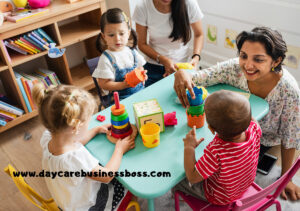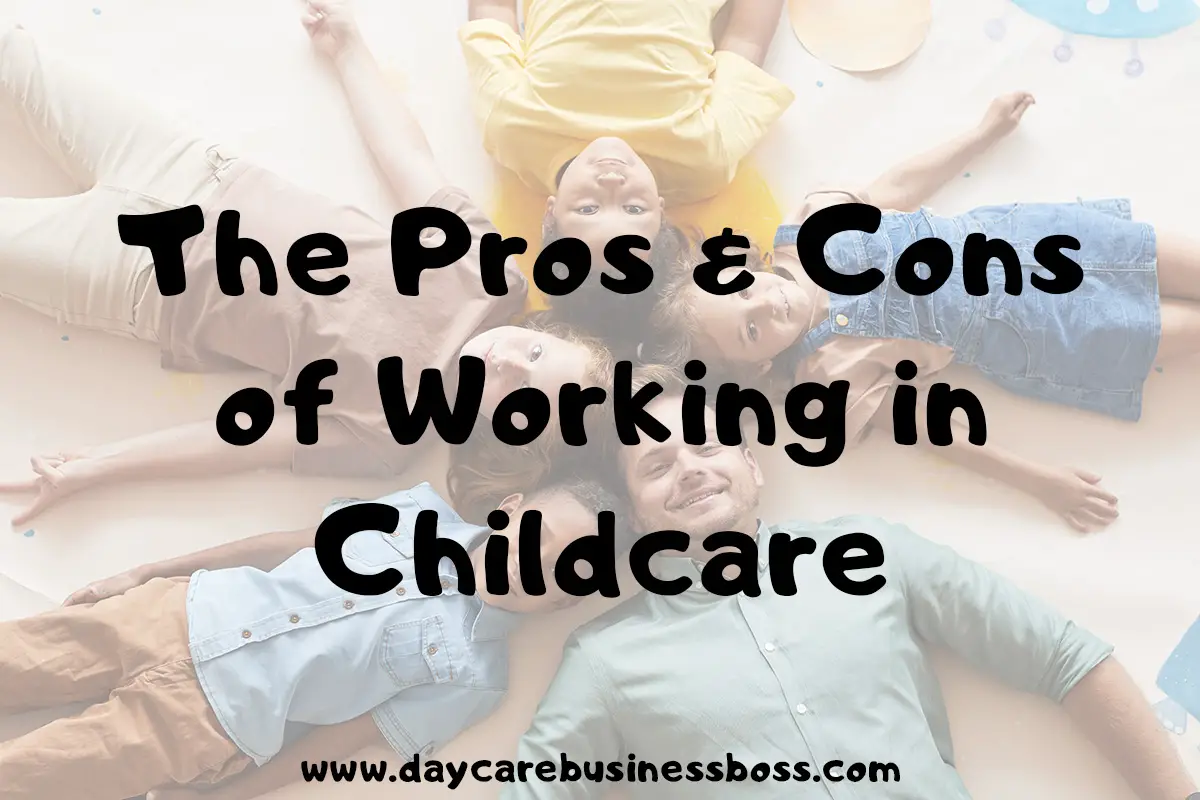Are sticky fingers and high-pitched giggles the things your dreams are made of? Do you have a passion for childcare? Do you find enjoyment in supervising and educating children? Are you contemplating childcare as a future career?
The pros and cons of working with children:
Pros:
- Working with different children
- Meaningful, impactful work
- Being a positive role model
- Earning a paycheck while playing games
- Relive old childhood memories
- You play an essential role
- Standard work schedule
Cons:
- Low wages
- Lack of retirement plans
- Children can be mean
- Demanding parents
- Childcare can be tiring
Working with small children can be one of the most memorable experiences of your life, but becoming a childcare worker is not a decision to be taken lightly. Sure, the benefits are numerous; days spent playing with young children while assisting them in learning and discovering new things. However, like with any profession, there are difficulties to consider when deciding to devote your life to the care of children. If you’re thinking of becoming a childcare worker, then this article has been written with you in mind. Pull up a chair, turn down the Cocomelon’s greatest hits, and let’s hit the highs and lows that you can find in childcare.
Let’s start with the basics: what is a childcare worker?

A daycare worker, or childcare provider, provides supervision and care for children’s basic needs in childcare facilities. As a daycare provider, you are tasked with ensuring the safety and well-being of children in your care.
Duties as a daycare provider may include:
- Providing care for children, such as setting schedules and routines, grooming, feeding, changing diapers, and cleaning rooms and toys.
- Maintaining a safe workplace by monitoring children for health, behavioral, and emotional issues and reporting concerns to staff and parents.
- Oversee the safety of children in your care.
- Encourage children’s emotional and social development by encouraging empathy for others and positive self-concepts.
- Maintain excellent verbal and written communication with parents and guardians to communicate about the children’s daily activities, behaviors, and related issues in your care.
Now that we’ve gotten that out of the way let’s move on to the main course!
Pros of working in childcare
 Working as a childcare provider can be one of the most rewarding experiences of your life. The benefits of working in childcare may include:
Working as a childcare provider can be one of the most rewarding experiences of your life. The benefits of working in childcare may include:
- Working with different children: One advantage of working in childcare is working with many different children and many different personalities. This type of environment really lends to your ability to develop your social skills.
- Meaningful, impactful work: As a childcare worker, you have the opportunity to influence the overall development of the children in your care.
- Being a positive role model: You’ll find that the children in your care look up to you. You could positively impact the lives of the children you interact with by teaching them positive and valuable life lessons.
- Earning a paycheck while playing games: Childcare lets you explore your own creativity as you create activities that engage young minds in learning, creating, and playing. Your days are filled with reading, coloring, painting, and endless imagination games. As a childcare worker, your job is to play with children, an integral part of their development.
 Relive old childhood memories: We tend to forget about the innocence and fun associated with our childhoods as we grow older and are saddled with the burdens of adulthood. However, as a childcare provider, you’re given a chance to relive the “good ol’ days” through your interactions with the children in your care.
Relive old childhood memories: We tend to forget about the innocence and fun associated with our childhoods as we grow older and are saddled with the burdens of adulthood. However, as a childcare provider, you’re given a chance to relive the “good ol’ days” through your interactions with the children in your care. - You play an essential role: Your role as a childcare worker is not only crucial to the children in your care but to the parents and guardians of those children. Without you, most parents/guardians would not be able to work to provide for their families. If you’ve ever had to take a child to work, you know the struggle. The care you provide allows parents/guardians to work without distraction while knowing their children are cared for.
- Standard work schedule: As a childcare provider, you will likely have a standard, scheduled workweek that begins and ends at set times. You will rarely have to deviate from your prescribed schedule, and you probably will not be required to work weekends. Your schedule as a childcare worker can result in a positive work-life balance, as you likely aren’t taking any work home (unless you really like little Sally and are willing to offer outside sitter services!).
These are just a few of the multitude of benefits that come from working in childcare. Of course, we can’t have sunshine without a little bit of rain. With that said, let’s move on over to the less sunny side of the street.
Check out these tips for training your childcare staff!
Cons of working in childcare
Though the benefits of becoming a childcare provider are numerous, as with any profession, there are some pitfalls. The drawbacks of working in childcare may include:
 Low wages: According to ZipRecruiter, as of 2021, the average annual salary for a childcare worker is around $22,000/year or less than $11.00/hour. Childcare providers tend to make a lower salary than comparable teaching positions and often find it necessary to take on a second job to ensure that bills are paid.
Low wages: According to ZipRecruiter, as of 2021, the average annual salary for a childcare worker is around $22,000/year or less than $11.00/hour. Childcare providers tend to make a lower salary than comparable teaching positions and often find it necessary to take on a second job to ensure that bills are paid.- Lack of retirement plans: Most childcare centers do not have a retirement plan set in place for employees, meaning you would need to make sure you are taking care of that on your own. With the lower salaries earned in the field of childcare, it is seemingly impossible to set aside money for retirement later.
- Children can be mean: Kids aren’t always pleasant. Children can be downright hateful and may even make derogatory comments regarding your appearance or other personal matters when they’re experiencing a rough day. It takes thick skin and emotional strength to endure what children may throw at you.
- Demanding parents/guardians: Not only can children be demanding and rude, but their parents/guardians can as well. Many times, parents/guardians may attempt to influence your decision regarding specific situations, like disciplinary actions. These types of interactions can take away your ability to properly control difficult situations and leave you feeling trapped in a corner.
 Difficult children: As a childcare worker, you will find that some children are just challenging, no matter what you do. Eventually, you will encounter a child that simply ignores every rule and refuses to accept you as an authority figure. Difficult children can make for a difficult day, especially if their actions are mimicked by their parents/guardians.
Difficult children: As a childcare worker, you will find that some children are just challenging, no matter what you do. Eventually, you will encounter a child that simply ignores every rule and refuses to accept you as an authority figure. Difficult children can make for a difficult day, especially if their actions are mimicked by their parents/guardians. - Childcare can be tiring: Being a childcare provider can be exhausting. It takes a lot of energy to keep pace with children and even more to constantly monitor them all day (have you ever tried to herd cats? It’s A LOT like that!). Children require constant attention, and it may be next-to-impossible for you to take a needed break.
These are just a few of the drawbacks to working in childcare. However, suppose your passion lies in caring for and educating children. In that case, the sunny side of the street shines far brighter than its darker counterpart.
Drawing it all together
As you can see, there are many advantages and disadvantages associated with being a childcare worker. It is crucial that you weigh out the good and the bad when deciding whether or not becoming a childcare provider is the career path for you.
Related Questions:
What is a typical day as a childcare worker like?
A typical day in the life of a childcare provider may include:
- Performing general administrative tasks, like attendance taking and answering phone calls.
- Keeping individual records for each child that include daily observations about activities, meals, and medications.
- Performing housekeeping duties, like sanitizing play areas, dishwashing, and general cleaning.
- Instructing children during activities, including mealtime, playtime, and nap time.
- Supporting the emotional and social development of the children in your care.
Please note: This blog post is for educational purposes only and does not constitute legal advice. Please consult a legal expert to address your specific needs.
To learn more on how to start your own daycare checkout my startup course and documents here.

Meet Shawn Chun: Entrepreneur and Childcare Business Fan.
I’m a happy individual who happens to be an entrepreneur. I have owned several types of businesses in my life from a coffee shop to an import and export business to an online review business plus a few more and now I create online daycare business resources for those interested in starting new ventures. It’s demanding work but I love it. I do it for those passionate about their business and their goals. That’s why when I meet a childcare business owner, I see myself. I know how hard the struggle is to retain clients, find good employees and keep the business growing all while trying to stay competitive.
That’s why I created Daycare Business Boss: I want to help childcare business owners like you build a thriving business that brings you endless joy and supports your ideal lifestyle.


